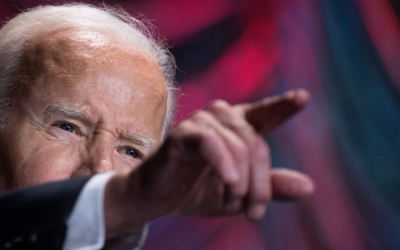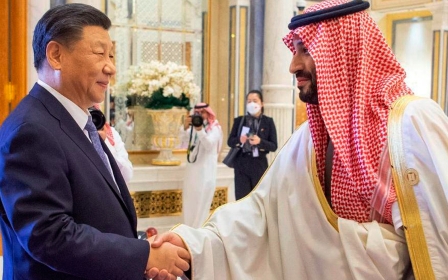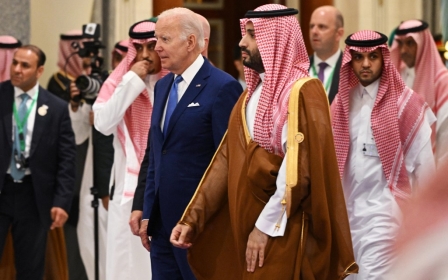'Not even politically smart': US-Saudi ties a one-sided affair in 2022
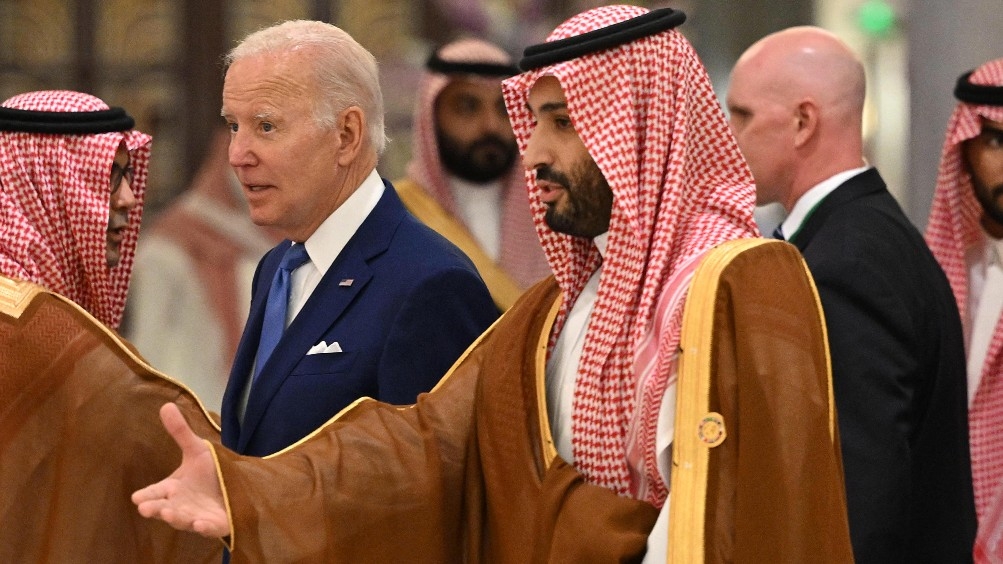
The year 2022 marked a significant year for US-Saudi relations, with the two countries clashing on several fronts over the past 12 months, including, most significantly, over a decision by Opec+ to significantly cut oil production.
Experts say the relationship - which for the past seven decades has been based on the exchange of oil for security - has been particularly unique this year, with it being largely one-sided, as Saudi Arabia received major concessions from the US while Washington was repeatedly snubbed.
Since US President Joe Biden has come into office, there have been several low points in the relationship, as well as growing signs of Saudi Arabia asserting its own interests outside of the partnership.
'Even interest-wise and in terms of realpolitik, it's not working for the US'
- Abdullah Alaoudh, Dawn
Biden's arrival as US president was a marked turning point in the relationship with Riyadh, which had four years of warm ties with the administration of Donald Trump.
But Biden had promised to make Saudi Arabia a "pariah", condemned Saudi Crown Prince Mohammed bin Salman, and even released an intelligence report revealing the US believed he had been responsible for the murder of Washington Post and Middle East Eye columnist Jamal Khashoggi.
New MEE newsletter: Jerusalem Dispatch
Sign up to get the latest insights and analysis on Israel-Palestine, alongside Turkey Unpacked and other MEE newsletters
Although Biden had made a number of moves to anger Riyadh in early 2021, this past year the US administration made numerous moves to appease the kingdom, while Saudi Arabia in turn rejected American requests to increase oil production.
"It's not even about democracy or human rights. Even interest-wise and in terms of realpolitik, it's not working for the US," Abdullah Alaoudh, the Gulf research director for Democracy for the Arab World Now (Dawn), told Middle East Eye.
"Now what MBS has been feeling so far is that he has legal immunity; he has political impunity; he has the military protection of the US. And all in return for nothing, just using oil as leverage against the Americans," Alaoudh said.
Saudi feigns neutrality in Ukraine war
In February, Russia launched its invasion of Ukraine, with the western world staunchly in support of Ukraine.
Saudi Arabia, like many other countries in the Middle East and other parts of the world, did not join in the condemnation of Moscow, but instead maintained a more neutral line.
Riyadh also refused a US request to boost oil production, sticking to a commitment arranged with Opec+, the Organisation of the Petroleum Exporting Countries and Russia.
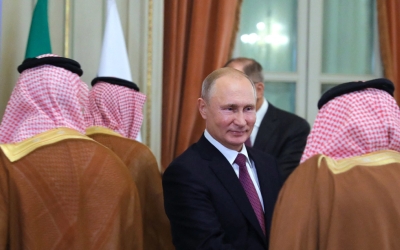
"The US and Saudi Arabia's relationship was very strained throughout 2022. Riyadh's relatively neutral position toward the Russian invasion of Ukraine upset Washington, which would have liked to have seen the kingdom align with the West against Moscow," said Giorgio Cafiero, CEO of Gulf State Analytics, a Washington-based geopolitical risk consultancy.
Instead, Mohammed bin Salman, the Saudi crown prince and de facto ruler, had a phone call with Russian president Vladimir Putin. Up until that point, he had reportedly snubbed calls from Biden.
Ellen Laipson, director of the international security programme at George Mason University's Schar School of Policy and Government, said in February that US ties with the Gulf were in a "current moment of considerable acute friction".
"It derives largely from the kind of intense demands that the western countries are making around the world that everybody participate in the isolation of Russia - because of Ukraine. And in some Gulf countries, that has not gone over well."
Biden's fist bump
In July, Biden visited Saudi Arabia in a trip that Saudi human rights activists said was a betrayal of the US president's campaign trail promises.
The visit, etched into history with the photo of Biden fist-bumping Mohammed bin Salman, was an attempt by the US administration to mend ties with Riyadh and stop the kingdom from drifting further towards Russia and China.
Biden's visit 'did much to contribute to the crown prince’s post-Khashoggi rehabilitation in the eyes of western powers'
- Giorgio Cafiero, Gulf State Analytics
"Biden received loads of criticism from human rights organisations and activists for having gone to the kingdom where he had his 'fist-bump' with the Saudi crown prince. Yet as a statesman, Biden decided that trying to mend fences with Mohammed bin Salman was in the US's national interest," said Cafiero.
The visit led to a signed agreement on 5G and 6G telecommunications networks in Saudi Arabia, and Riyadh agreed to open its airspace to Israeli civilian flights in exchange for Saudi control over the Red Sea islands of Tiran and Sanafir. The truce in Yemen was also extended for another two months. It later expired in October.
However, Biden left Jeddah without an agreement on boosting oil production or normalising relations with Israel, two major goals of the visit.
The Biden administration also said that it would continue to hold the kingdom accountable over human rights issues, and the US president said he raised the murder of Washington Post and Middle East Eye columnist Jamal Khashoggi with the Saudi crown prince.
However, just soon after the visit ended, Saudi Arabia sentenced an American citizen to 16 years in prison and handed down decades-long sentences to multiple Saudi rights activists in the kingdom.
"Irrespective of how wise (or unwise) it was for Biden to make that trip, the visit by the US president did much to contribute to the crown prince’s post-Khashoggi rehabilitation in the eyes of western powers," Cafiero told MEE.
Opec+ oil production cut
The visit by Biden was an attempt to smooth over the soured ties between the two longtime partners. However, tensions only escalated higher by October, when Saudi Arabia and Russia-led Opec+ decided on an oil production cut of two million barrels a day.
The Opec+ decision was met with outrage in Washington, with US officials and lawmakers both looking at ways in which Washington could break up the oil cartel or use leverage against Saudi Arabia to reverse the move.
A group of lawmakers introduced legislation to halt all military support to Saudi Arabia, as well as the United Arab Emirates.
Senator Bob Menendez, chair of the Senate Foreign Relations Committee, said that "the United States must immediately freeze all aspects of our cooperation with Saudi Arabia" beyond "what is absolutely necessary".
"We need to be tough on them and immediately halt all US arms sales to Saudi Arabia. Let’s use our leverage," Congressman Ro Khanna told MEE in October.
However, since then the outrage has not led to any concrete actions. And with gas prices in the US having fallen significantly, officials have said the initial bitterness about the Opec+ decision has subsided.
All the while, Saudi Arabia is enjoying a major boost in revenue from oil sales this year. The country is on track to match its 2012 record for oil revenue, which was $337bn, according to Bloomberg.
Biden's concessions to Riyadh
While the relationship continued to remain tense, the Biden administration still made moves that aided the Saudi crown prince, including in November when it filed a court document saying that Mohammed bin Salman has diplomatic immunity from a lawsuit filed against him over the murder of Khashoggi.
Then, this past month when US Senator Bernie Sanders attempted to put to a vote a Yemen War Powers Resolution that would have completely ended American support for the Saudi-led coalition's war efforts, the White House intervened last-minute to convince lawmakers not to vote for the bill. Ultimately, Sanders pulled the vote.
The interventions from the Biden administration angered human rights activists who have been trying to use any means they can to hold the kingdom accountable for rights abuses.
But on another level, experts say that all the concessions given to Riyadh were done without any tangible benefit to the US.
"It's not even politically smart. I mean, if it was any other administration, at least they would have let the court decide and use that against the Saudis as leverage to get what they want," Alaoudh said about the Biden administration's intervention in the Khashoggi lawsuit.
Looking ahead to 2023
Cafiero said that the US-Saudi relationship in the year ahead will likely continue to be strong despite the tensions that were in place all throughout the past year.
And the two nations can continue to focus on shared interests, such as their shared adversary, Iran.
Saudi Arabia has been vocally concerned with US plans to return to the Iran nuclear deal - which Biden's predecessor Donald Trump left in 2018 - and had called for a stronger agreement on Tehran.
"If the Islamic Republic of Iran's foreign policy becomes increasingly aggressive in the region in 2023, it is worth considering how the US and Saudi Arabia may deepen bilateral coordination in the face of an increasingly serious Iranian threat," Cafiero said.
Cafiero added that while he expects the relationship to remain strong in 2023, he still expects "the relationship between the Biden administration and the kingdom to remain quite unfriendly and there could be more gestures from both sides to the other which signal anger and frustration".
"If the same thinking of the administration about this relationship is still there; if you have the same engineers who engineered this dysfunctional relationship with what it is, it will continue as such," said Alaoudh, who described the current US approach as "short-sighted".
Middle East Eye delivers independent and unrivalled coverage and analysis of the Middle East, North Africa and beyond. To learn more about republishing this content and the associated fees, please fill out this form. More about MEE can be found here.


